The doubt is now removed: North Korea confirmed, on Sunday February 19, that it had fired an intercontinental ballistic missile (ICBM) the day before as a joint warning to the United States and South Korea.
North Korean leader Kim Jong-un ordered a surprise "launch exercise" at 8 a.m. local time (midnight CET) on Saturday. A Hwasong-15 missile was then fired from Pyongyang airport during the afternoon, according to the state agency KCNA. The first test of a Hwasong-15 was conducted by Pyongyang in 2017.
The South Korean military had claimed to have detected the launch of an ICBM on Saturday at 5:22 p.m. local time (9:22 a.m. Paris time) which, according to Tokyo, flew for 66 minutes over a distance of about 900 kilometers, before falling into its Exclusive Economic Zone (EEZ) and which, according to its observations, would be able to strike the American continent.
A first test for seven weeks
North Korean authorities hailed the test - the country's first in seven weeks - which they said demonstrates "the effective [combat] capability of ICBM units, capable [of carrying out] a mobile and powerful counterattack", according to KCNA. The launch is "clear proof" of the reliability of Pyongyang's "powerful physical nuclear deterrent", the agency added.
He came as South Korea and the United States prepare to conduct a simulation exercise, to be held next week in Washington, to discuss what to do if the nuclear weapon by Pyongyang.
Kim Jong-un's regime on Friday threatened to respond with "strong and unprecedented countermeasures" to the upcoming U.S.-South Korean maneuvers, seeing them as preparations for armed conflict and the cause of a deterioration of the security situation on the Korean peninsula.
According to US-based security expert Ankit Panda, Saturday's test is of considerable significance because the firing "was ordered the same day, so it's not a traditional 'test', but of an exercise".
This exercise appears to be "Kim's way of telling the United States and [South Korea] that his country continues to improve its ballistic missile skills for possible use in a real-time scenario." , observes Soo Kim, a former CIA analyst.
"Weapons are not just for display," she also told Agence France-Presse, adding, however, that the nine hours that elapsed between Kim Jong-un's order and the shooting constituted "a period of long ". Pyongyang could face "greater challenges" if it launches under "realistic" conditions, she said.
International convictions
"This firing unnecessarily escalates tensions and risks destabilizing security in the region," White House National Security Council spokeswoman Adrienne Watson said on Saturday. "It constitutes a flagrant violation of multiple UN Security Council resolutions," the US official added.
In a joint statement, the foreign ministers of the G7 countries - Germany, Canada, United States, France, Italy, Japan, United Kingdom - for their part condemned "the irresponsible behavior of North Korea" which demands "a unified response from the international community". According to them, "this act constitutes a flagrant violation of the resolutions of the United Nations Security Council and threatens regional and international peace and security".
The European Union for its part denounced "a dangerous and reckless action that endangers international and regional peace and security", according to a press release from the spokesperson for the head of European diplomacy, Josep Borrell.
Regain de tension
The year 2022 was marked by a strong resurgence of tension on the peninsula. The parenthesis of relative appeasement initiated in 2018 by South Korean President Moon Jae-in (2017-2022), which was marked by the 2018 and 2019 summits between Kim Jong-un and the President of the United States, Donald Trump ( 2017-2021), seems definitively closed.
In early 2022, North Korea's leader called for "strengthening national defense capabilities". The war in Ukraine contributed to confirming this choice. Pyongyang gives unfailing support to Moscow. The regime recognized Russia's annexation of Ukrainian territories and reportedly supplied Moscow with 100,000 shells. In exchange, the Russian President, Vladimir Putin, spoke of economic and military aid to Pyongyang.
The arrival of Yoon Seok-youl to power in Seoul, elected on the promise of a policy of firmness vis-à-vis Pyongyang, a strengthening of the alliance with the United States and a rapprochement with Japan, also convinced North Korea to harden its positions.
All joint military maneuvers between the United States and South Korea infuriate Pyongyang, which sees them as a rehearsal for a possible invasion and has often responded with threats and drills from its side.
On Sunday, Pyongyang's spokeswoman and sister to its leader, Kim Yo-jong, said it was these measures taken by Seoul and Washington that "constantly endanger" the peninsula and deteriorate its "stability", according to KCNA. "I warn that we will monitor every movement of the enemy and engage the corresponding, very powerful and overwhelming countermeasure against all such movements hostile towards us," she added.












